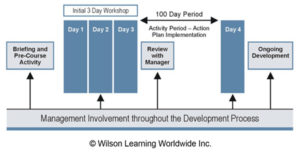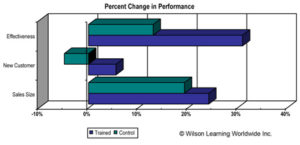Executive Summary
While it is necessary for salespeople to have the skills to listen effectively to customers’ needs, present the features and benefits of their products to clients, and guide customers to a buying decision, in many industries, that is not sufficient to create high sales performance. For many organizations, salespeople need to also be effective business consultants; they need to be experts who can deal with complex systems issues and can help facilitate change in their clients’ organizations.
The value of these skills was effectively demonstrated in a study with a large European insurance company. Three key strategic drivers showed significant improvement after salespeople completed a process designed to teach them business consulting skills. When compared to salespeople who did not receive the consultant skill development, these salespeople showed:
- 18 percent greater increase in sales
- 11 percent greater increase in new customer sales
- 5 percent greater increase in the average size of each sale
The results provide strong support for the value of business consulting skills and the ability of an effective training process to transfer learning to job performance.
Business Consulting Skills
In many industries, companies need salespeople to be a source of competitive advantage. This is most keenly felt in industries where there is a great deal of competition, it is difficult to create product or service differentiation, and economies of scale do not provide great price advantages.
The business-to-business insurance industry is a good example. First, there are many competitors chasing the same business. Second, the industry is mature and the technology that underlies insurance products and pricing is well known, making product differentiation difficult. Finally, through mergers and acquisitions, many of the competitors are very large global players, so that no single competitor can gain an advantage through economies of scale. As a result, organizational leaders face the question of how to create differentiation and competitive advantage through sources other than product, size, or price.
At Wilson Learning, our experience suggests that providing salespeople with skills to be effective business consultants can provide an important source of competitive differentiation. By learning a consultative process, identifying appropriate methods for understanding the customer’s business, and then applying these methods effectively, salespeople will approach their clients more strategically and generate more profitable and compelling solutions for their clients. The better business consultants salespeople are, the more successful their sales performance.
The Study
The purpose of this study was to examine the impact of consultant skills on sales performance.
The Program
 This was more than just a three-day workshop on consulting skills. To ensure that the salespeople not only learned consulting skills, but also were provided the support needed to implement the skills, we followed the process represented in the graphic at right. The program started with pre-workshop planning, after which participants attended a three-day workshop referred to as Consulting with Clients (CWC). After completing CWC, participants received an action planning guide and then met with their manager to discuss implementation. During the next 100 days, the salespeople periodically reviewed their performance with their manager and received coaching on the use of the skills. Following that 100-day implementation period, they attended a one-day follow-up session, during which they planned ongoing development activities.
This was more than just a three-day workshop on consulting skills. To ensure that the salespeople not only learned consulting skills, but also were provided the support needed to implement the skills, we followed the process represented in the graphic at right. The program started with pre-workshop planning, after which participants attended a three-day workshop referred to as Consulting with Clients (CWC). After completing CWC, participants received an action planning guide and then met with their manager to discuss implementation. During the next 100 days, the salespeople periodically reviewed their performance with their manager and received coaching on the use of the skills. Following that 100-day implementation period, they attended a one-day follow-up session, during which they planned ongoing development activities.
The participants were divided into three groups. One group started the program in September, one in October, and the final group in November. We staggered start dates in order to reduce the potential impact of the business cycle on the results.
Trained and Control Groups
To ensure that changes in performance were due to the impact of the training program, we also identified a control group of salespeople who were not trained. In total, there were 59 salespeople involved in the study; 27 salespeople received training in the consulting skills and 32 salespeople were in the control group. Participants in the control group had levels of experience and performance similar to the trained group participants.
The Performance Measures
To prove the impact of consultant skills on the company, strategically important performance metrics were needed—not just a change in perception or attitude, but a real bottom-line outcome. For this study, three performance measures were identified as strategically important to the company.
Effectiveness: The percent change in monetary commission earned by the salespeople over the period of the study. The company has long used this as a measure of sales effectiveness.
New Customers: The percent change in sales from new customers made over the study period. This represents the extension of sales into new customer accounts, new territories, and new markets.
Sales Size: The percent increase in monetary value of each sale. This represents the salesperson’s ability to sell larger, more complex product configurations.
These performance measures were collected for the three months just prior to the beginning of the CWC training, then again for the three months after the completion of the one-day follow-up program. By extending the analysis over a three-month period, we reduced the impact of monthly variations on the results.
Findings
 Results of this study provide convincing evidence that the consultant skills had an impact on all three performance measures. The graph at right summarizes the percent increase or decrease in the three measures for both the trained group and the control group.
Results of this study provide convincing evidence that the consultant skills had an impact on all three performance measures. The graph at right summarizes the percent increase or decrease in the three measures for both the trained group and the control group.
Effectiveness Impact
The control group, which did not receive any training, improved performance by 13%. Given that about three-and-a-half months passed between the pre- and post-measurement, some improvement in the control group can be expected. However, the group that received the consultant skills training more than doubled that improvement, showing a 31% increase in revenue.
This indicates that the consultant skills did have a significant impact on the salesperson’s overall ability to sell and increase revenue. The next two measures provide some insight into the underlying causes of this increase.
New Customer Impact
Sales from new customers actually declined for the control group by approximately 5%. In contrast, the trained group’s sales from new customers increased by 6%. Thus, the net difference in sales from new customers between the control group and trained group was 11%.
This suggests that the consultant skills allowed the salespeople to more effectively analyze and understand new customer needs and expectations. As a result, they were able to convince more new customers of the value of their solution and close more business.
Average Sales Size Impact
Consultant skills enable salespeople to develop a deeper understanding of their customers’ needs and expectations. As a result, they can identify products and services that address a wider range of needs, thus winning bigger individual sales. The results of this study provided confirmation of this. The average size of each sale increased for both the control group and trained group, but the trained group had a greater increase in average size (19% versus 24% respectively).
Conclusions
As a result of developing consultant skills, salespeople were able to identify the needs of a broader set of customers, both existing and especially new customers. For each customer, their consultant analysis allowed them to link their products to a broader set of needs, making each individual sale larger. The overall result is more revenue for the organization, as reflected in higher commissions for the salespeople.
Earlier we indicated that the consulting skills learning process was more than just a three-day training event. Over a 100-day period, additional support, reinforcement, and application tools were provided. While this study does not specifically assess the impact of these additional performance support elements, we believe that these made significant contributions to the results. Consultant skills are difficult to learn and even more difficult to initially apply. Furthermore, we have evidence from other studies that indicates these elements add to the effectiveness of learning beyond the impact of simple training programs. (For more information, see the reference listed below.)
In conclusion, the data from this study provides strong evidence that these consultant skills, the Consulting with Clients program, and the performance support process used here are powerful tools for improving sales performance. The analysis clearly shows that consultant skills have multiple positive effects on performance, indicating that the skills learned were flexibly applied to the unique needs and expectations of customers, resulting in improved revenue, additional customers, and larger individual sales.

